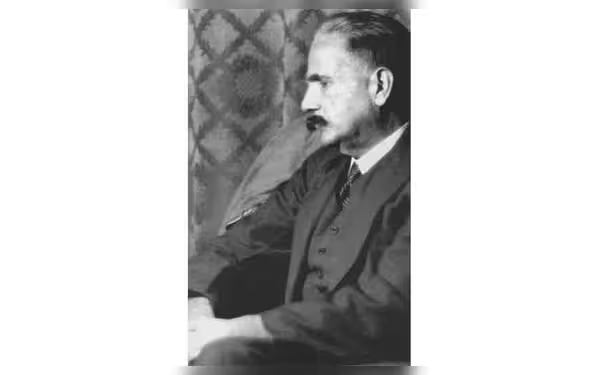Saturday, November 16, 2024 05:34 PM
Iqbal's Vision for De-Coloniality in Pakistan
- Iqbal's poetry inspired resistance against colonial rule.
- He advocated for a separate Muslim state in India.
- Iqbal's ideas promote indigenous governance and identity.
 Image Credits: thenews
Image Credits: thenewsExplore Iqbal's influence on de-coloniality and his vision for a separate Muslim state in Pakistan.
Allama Muhammad Iqbal, a prominent Urdu poet and philosopher of the early 20th century, played a crucial role in shaping the intellectual landscape of India during the colonial era. Born in Sialkot, Punjab, Iqbal was deeply influenced by the rich cultural and religious traditions of his homeland. His education spanned both indigenous and colonial institutions, allowing him to absorb diverse ideas that would later inform his thoughts on de-coloniality.
Iqbal's upbringing in a family with Kashmiri Brahmin roots and a Punjabi Muslim mother provided him with a unique perspective on the socio-cultural dynamics of his time. He was educated in Persian, Arabic, and Hindustani, but also attended colonial schools like Scotch Mission High School and Government College in Lahore. This blend of traditional and modern education allowed Iqbal to critique the colonial structures that dominated his society.
As the British colonial influence began to permeate Punjab, Iqbal recognized the detrimental effects of colonialism on the local worldview. He articulated these sentiments through his poetry, expressing a longing for a return to the rich traditions of pre-colonial India. His famous poem, "Hamara Des" (Our Homeland), which he performed at a student gathering in Lahore, resonated with the youth and became an anthem of resistance against colonial rule.
During his time at Cambridge University, Iqbal encountered a Christian missionary who portrayed India as a land of ignorance and poverty. This portrayal ignited a passionate response from Iqbal, who eloquently defended the cultural and historical richness of pre-colonial India. His arguments not only challenged colonial narratives but also inspired a sense of pride among his peers.
Iqbal's philosophical journey led him to advocate for a re-interpretation of Islamic thought, emphasizing the need for a radical reconstruction of religious ideas to align with contemporary realities. His lectures, later compiled in "Reconstruction of Religious Thought in Islam," highlighted the importance of adapting religious interpretations to the changing socio-political landscape.
Politically, Iqbal's vision for a separate Muslim state emerged from his understanding of the marginalization of Muslims in colonial India. His presidential address at the All India Muslim League in 1930 articulated the idea that Indian Muslims constituted a distinct political nationality, deserving of autonomy or a separate state. This vision laid the groundwork for the eventual creation of Pakistan.
Despite the establishment of Pakistan, many scholars argue that the country has remained in a neo-colonial state, struggling to fully decolonize its institutions. Iqbal's ideas continue to serve as a source of inspiration for those advocating for a more indigenous and self-determined approach to governance and societal structures.
Iqbal's legacy is not just that of a poet or philosopher; it is a call to action for future generations to reflect on their identity and the impact of colonialism. By drawing from Iqbal's insights, we can strive to de-colonize our institutions and foster a society that honors its rich heritage while embracing modernity. The journey towards true independence and self-determination is ongoing, and Iqbal's vision remains a guiding light in this endeavor.













